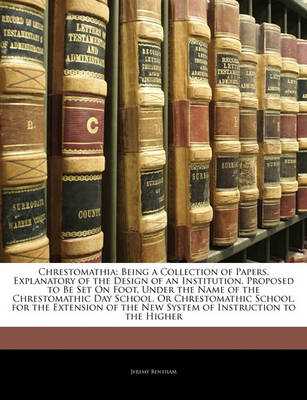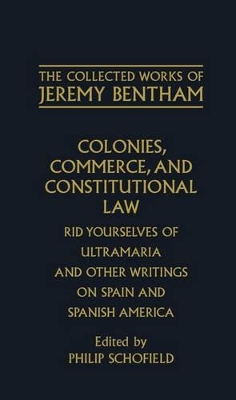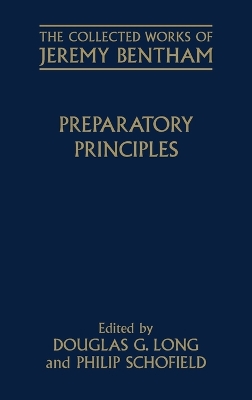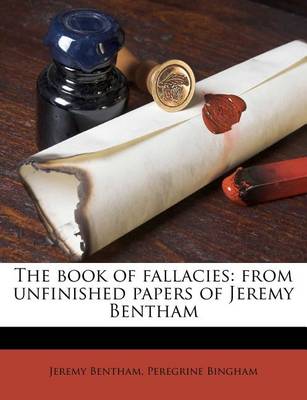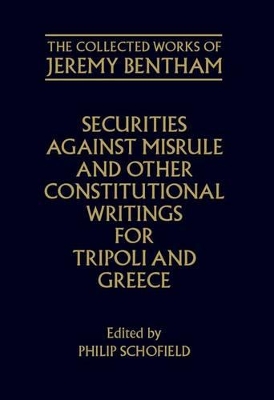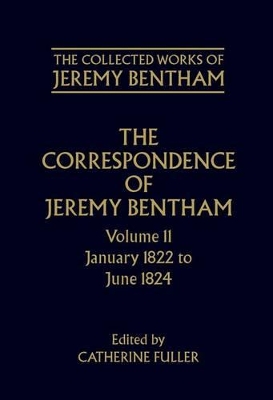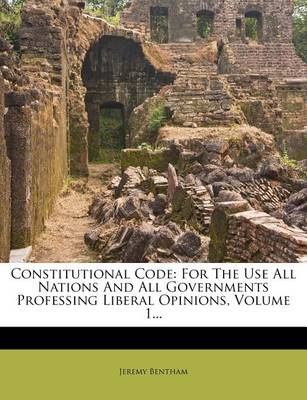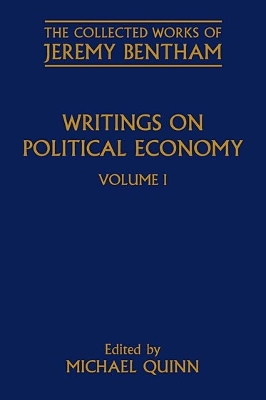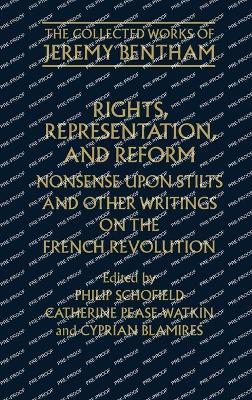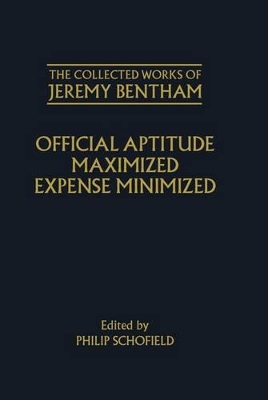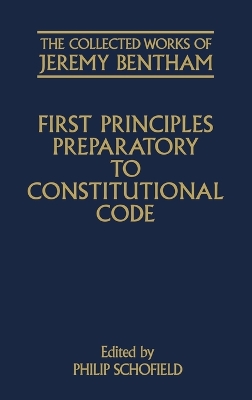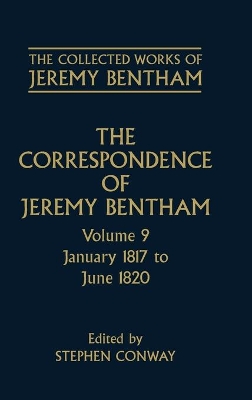The Collected Works of Jeremy Bentham
19 total works
Commercial System', is generally regarded as an early classic statement of the beneficial effects of freedom of trade. In the these pioneering essays written in 1820-2, Bentham provided a penetrating critique of colonialism from within the liberal utilitarian tradition. Applying his general principles to the case of
Spain and Spanish America, he argued that any attempt by Spain to maintain dominion over her Empire, or even to maintain a claim to the dominion was fundamentally misguided. Colonies were not a source of wealth to the colonizing country, but rather led to the imposition of increased taxation. Moreover, the existence of colonies increased the amount of patronage at the disposal of Spain's rulers, and thus would facilitate the corruption of the members of the new legislative assembly and
eventually lead to the restoration of the ancient despotism. Colonies were not only wasteful and expensive, but posed a threat to constitutional government itself. The should therefore be granted unconditional independence, as a prererequisite to the establishment of unrestricted commercial relations,
which would produce mutual benefit to both Spain and Spanish Amarica.
Introduction to the Principles of Morals and Legislation. Inspired by such figures as John Locke and Claude Adrien Helvetius, Bentham developed an original ontological and epistemological basis for legal terminology, with the aim of replacing the traditional terminology of English law with that of universal
jurisprudence. The work that dominates the text, in that Bentham returns to it time and time again in order to offer criticism of it, is William Blackstone's Commentaries on the Laws of England. While unorganized and fragmentary, the material in Preparatory Principles constitutes a remarkable record of the evolving ideas of a major legal philosopher at a formative stage of his career.
in particular in the British Parliament, in order to prevent reform.
Bentham not only identified, described, and criticized the fallacious arguments in question, which were all characterized by their irrelevancy, but explained the sinister interests that led politicians to employ them and their supporters to accept them. By exposing these political fallacies, Bentham hoped to prevent their employment in future, and thereby to place political debate on its only proper ground, namely considerations drawn from the principle of utility.
During the years covered by this volume, Bentham's Panopticon penitentiary scheme was finally rejected by the government; and his efforts to secure its implementation, and then to gain adequate compensation, form a major and recurring theme. But the letters do much more than complete the Panopticon saga. They give an insight into Bentham's relations with his editors and followers Étienne Dumont and James Mill, and provide information on the writing, editing, and in some cases, printing and
publishing of works on law, politics, religion, and education. Just as important is the clear impression the correspondence gives of his contacts, especially with the legal and political reformers of the day. Prior to these new volumes, the only edition of Bentham's works was a poorly edited and
incomplete one brought out within a decade or so of his death.
In 1802 Bentham started to acquire an international reputation through the publication of his Traités de législation civile et pénale. The correspondence contains information about the numerous last-minute revisions which Bentham suggested, about early reactions to the work, and about its translation into Russian. When, in 1802 - 3, Bentham failed in his attempt to get his Panopticon penitentiary project implemented by the government, he turned his attention to adjective law,
writing extensively about evidence and procedure, and in 1808 he published a substantial pamphlet on the reform of the Scottish judicature. Exchanges of letters with Sir Samuel Romilly, Francis Horner and others throw some light on the composition of these works and also illuminate aspects of his personal life:
his relationships with his brother Samuel, with his Genevan editor Etienne Dumont, with Lord Holland's sister Caroline Fox, to whom he proposed marriage in 1805, and with Aaron Burr, adventurer and former vice-president of the United States, who formed a close friendship with him in 1808.
Securities against Misrule and Other Constitutional Writings for Tripoli and Greece
by Jeremy Bentham
Turning his attention towards the Mediterranean basin, Bentham here attempts to legislate for one Islamic state, and offers advice to another in the process of throwing off Islamic rule. The Writings for Tripoli include the famous `Securities against Misrule', in which Bentham draws up a constitutional charter with an accompanying explanation of its provisions. He also discusses the social, political, and religious institutions of the country, and proposes a scheme for the introduction of
constitutional reform both there and in the other Barbary states. The Writings for Greece include a rare commentary on the first Greek constitution of 1822, and advice and warnings to the Greek legislators against the temptation of `sinister appetites'. The main theme in both groups of writings is the
efficacy of representative institutions and the publicity of official actions in preventing the abuse of government power.
reputation, and corresponded with leading figures in Europe, the United States of America, and many of the newly independent states of Central and South America. His correspondents included such notable figures as Simón Bolívar, the Liberator of South America; Jean Pierre Boyer, President of Haiti; José da Silva
Carvalho, Minister of Justice in Portugal; Étienne Dumont, Bentham's Genevan editor; Bernardino Rivadavia, first President of the United Provinces of Río de la Plata; Jean Baptiste Say, the economist; and members of the provisional government of Greece. Bentham also corresponded with numerous public figures and personal friends in Britain, including Edward Blaquiere, James Silk Buckingham, Richard Carlile, John Cartwright, Rowland and Matthew Davenport Hill, James Mill, Samuel Parr,
Francis Place, Leicester Stanhope, and Frances Wright.
As well as covering such matters as the launch of the Westminster Review, and his first plan for the Auto-Icon, the volume testifies to the growing importance to Bentham of his writings on codification. Having received news that the Portuguese Cortes had accepted his offer to draw up a complete code of laws, he began to draft material for his Constitutional Code. He became involved in promoting constitutional reform in Tripoli and Greece, and was extensively involved in the
negotiations surrounding the Greek Loan raised in London in 1824.
procedures of the Buenos Aires assembly, and as recently as the early 1990s it was reprinted by the Spanish Cortes. With typical thoroughness and insight, Bentham discusses such central themes as the publicity of procedings, the rules of debate, the conduct of deputies, and the proper steps to be taken in
composing, proposing, and voting on a motion. Even such relatively minor points as the size of the assembly-room and the costume of the deputies are not overlooked. All along Bentham illustrates his points by reference to the actual practice of both the British Houses of Parliament and the French provincial assemblies.
Bentham himself published, covers chapters I-IX on the electorate, legislature, prime minister, and administration. The fully annotated text clarifies and develops historical allusions, and is provided with an especially detailed subject index.
some reputation for Bentham in political economy. In 1790, whilst preparing a second edition, Bentham drafted the raft of additional materials included here in five appendices. At the same time he began Manual of Political Economy, an introductory handbook which he never finished, while the surviving text appears here, supplemented
by seven appendices. In March 1793 Bentham reacted to press reports of the Irish Budget by composing A Protest against Law Taxes, a trenchant critique of the taxation of legal proceedings, and the denial of justice to the poor, which was printed in 1793, published in 1795, and extended in 1816, and which completes the volume.
utilitarian justification of political equality and representative democracy, even recommending women's suffrage. Moreover, he provided a major critique of the dominant constitutional theory of the division of power, including both the doctrine of the balance of powers and that of the separation of
powers. Turning his attention to Britain, for a time he advocated measures of parlimentary reform, but becoming disenchanted with the course of the Revolution he produced the celebrated 'Nonsense upon Stilts' (hitherto known as 'Anarchical Fallacies'), the most devastating attack on the theory of natural rights ever written, in which he argued that natural rights provided an unsuitable basis for stable legal and political arrangements. All the essays published in this volume, with the
exception of Emancipate your Colonies!, an important early critique of colony-holding, are based on the original manuscript sources, many of which have not been previously published in any form.
Despite Bentham's importance as jurist, philosopher, and social scientist, and leader of the Utilitarian reformers, the only previous edition of his works was a poorly edited and incomplete one brought out within a decade or so of his death. This new critical edition of his works and correspondence is being prepared by the Bentham Committee of University College London.
own recommendations for good administration, which he had fully developed in his magisterial Constitutional Code, with the severe deficiencies he saw in English practice. The core of the volume consists of four major essays directed against the principles and policies of four leading statesmen: Edmund Burke,
George Rose, Robert Peel, and Lord Chancellor Eldon. Of particular concern to Bentham were the abuses sanctioned by the judges and their officials in the Westminster Hall courts, which, he argues, resulted in the denial of justice to the majority of the population. In this volume, Bentham not only displays the precise logical reasoning for which he is well known, but also his considerable skills as a rhetorician of reform.
Constitutional Code . In addition, original and penetrating discussions of such topics as sovereignty, constitutional rule, democratic and monarchical government, public finance, the aptitude and powers of officials, corruption, the influence of public opinion, and the delusive effect of religion and
titles of honour, affirm Bentham's status as a political theorist of the first rank. As an important application of utilitarian principles to the structure and organization of government, and a major contribution to the theory of representative democracy, this volume will be of interest to students of philosophy, law, politics, economics, and history.
even in that year Bentham's involvement in the world of radical politics emerges clearly. The volume also testifies to his burgeoning international reputation, and to his interest in reform in North and South America, Russia, Spain, France, and Geneva.
Deontology. Together with a Table of the Springs of Action and The Article on Utilitarianism
by Jeremy Bentham
critical and explanatory notes.
